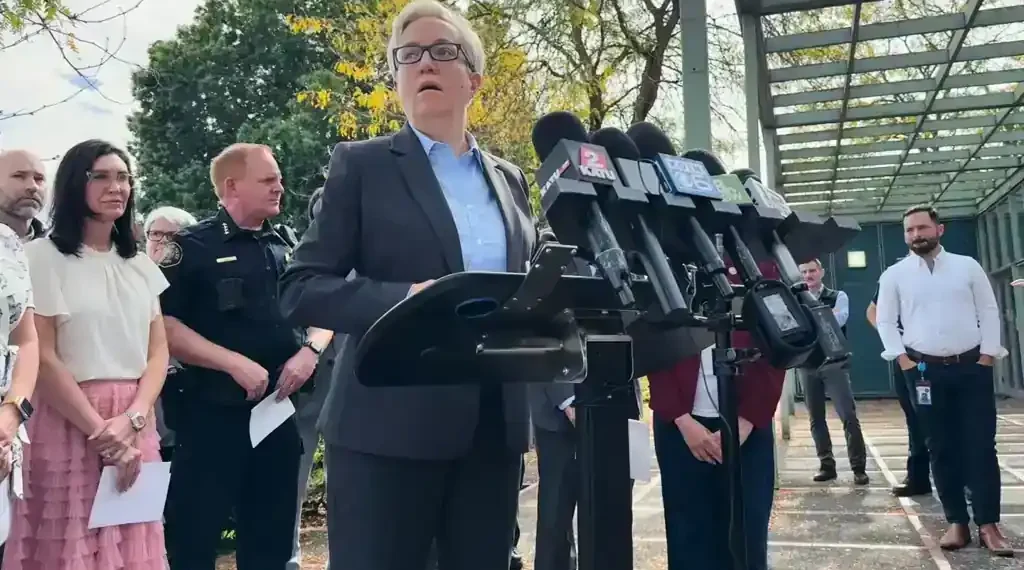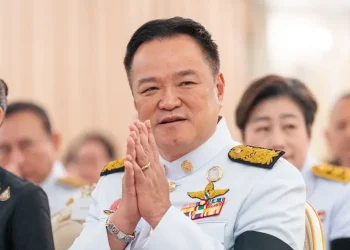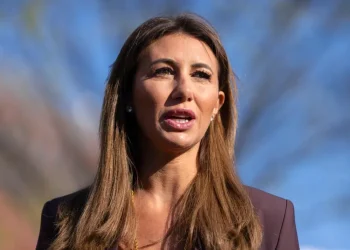Trump Says Troops Will Be Sent to Portland Amid Local Opposition
Published: September-28-2025, 19:15 EDT
Former President Donald Trump announced plans to send U.S. troops to Portland, Oregon, authorizing what he described as “Full Force, if necessary” to confront what he called “domestic terrorists.” His statement, delivered on social media Saturday, drew immediate rejection from state and local officials who argue the city is stable and does not require military intervention.
Oregon Governor Tina Kotek, Portland’s mayor, and local business leaders said Trump is overstating conditions and attempting to exert federal authority over a city they say is managing its public safety effectively.
Trump’s Announcement on Social Media
In his post, Trump said he directed the Department of Defense to “provide all necessary troops to protect war-ravaged Portland,” alleging that U.S. Immigration and Customs Enforcement (ICE) facilities in the city were “under siege from Antifa and other domestic terrorists.”
The White House and Department of Defense did not immediately provide details about the scope, timing, or type of forces that could be deployed. Pentagon spokesperson Sean Parnell later said only that the military stood “ready to mobilize” if directed.
Governor Kotek Rejects Federal Intervention
At a Saturday afternoon news conference, Governor Tina Kotek said she told Trump directly, as well as Homeland Security Secretary Kristi Noem, that Oregon does not need troops.
“We can manage our own local public safety needs. There is no insurrection. There is no threat to national security,” Kotek said.
She added that Trump gave no timetable for a deployment and that she does not intend to call up the Oregon National Guard. “This is an American city. We do not need any intervention,” said Portland Mayor Keith Wilson, echoing her remarks.
Concerns Over Federal Authority
Kotek stressed that she believes the president does not have the legal authority to send federal troops into Portland without state approval. Her comments follow earlier disputes between states and the Trump administration over the use of federal forces in domestic settings.
Trump previously deployed National Guard units and active-duty Marines to Los Angeles in defiance of California Governor Gavin Newsom, a move later challenged in court. A federal judge ruled the action unlawful, but the decision remains under appeal.
Kotek urged residents to stay calm and avoid escalation. “Let’s not take the bait. Let’s not respond to what the president is trying to do,” she said.
Portland Residents Express Doubt
While Trump characterized the city as unstable, life in Portland on Saturday appeared routine. Residents jogged along the Willamette River, relaxed near fountains, and biked under clear skies.
“Where’s the emergency?” asked Allen Schmertzler, 72, who said he was “disgusted” by Trump’s decision.
Another local, John McNeur, 74, called Trump’s statement “ridiculous” while strolling downtown. “This place is not a city that’s out of control. It’s just a beautiful place,” he said.
Protests and Troop Deployments in Other Cities
Portland is not the only city on Trump’s list. He has also named Chicago and Memphis as potential deployment sites. While he previously threatened to send National Guard units into Chicago, no troops have been dispatched.
In Memphis, however, a deployment is expected soon involving about 150 troops—significantly fewer than the numbers sent to Los Angeles or Washington, D.C., during earlier protests. On Saturday, between 80 and 100 Memphis residents marched to City Hall to oppose the move, holding signs that read “Resources Not Task Forces” and “Memphis Don’t Need No Occupation.”
Protest organizers said the city needs investments in education, healthcare, and youth services rather than federal enforcement actions.
Portland’s Protest History
Portland, with a population of 636,000, became a national focus during the 2020 racial justice demonstrations following the killing of George Floyd in Minneapolis. Some of those protests involved clashes between demonstrators and federal officers sent by the Trump administration to protect federal property.
In recent months, protests have been smaller and largely centered around the ICE building outside downtown. Its windows have been boarded up, and security has been reinforced following prior vandalism. Federal Protective Services currently oversee security there.
Police Chief Bob Day emphasized that local police do not participate in immigration enforcement and would only act in cases of vandalism or criminal activity near the facility.
Federal and Local Dispute Over Authority
A spokesperson for the Oregon National Guard, Lt. Col. Stephen Bomar, confirmed that “no official requests have been received” for Guard deployment. He said any requests would need to be approved by the governor.
Meanwhile, Oregon’s congressional delegation—except Republican Representative Cliff Bentz—sent a letter condemning Trump’s announcement. “This unilateral action represents an abuse of executive authority, seeks to incite violence, and undermines the constitutional balance of power,” the lawmakers wrote.
City Recovery and Public Safety Data
Despite Trump’s description of Portland as “war-ravaged,” city officials say the area has made significant strides in recovery since the height of the 2020 protests.
This summer marked the busiest pedestrian season downtown since before the pandemic, according to city reports. A recent study by the Major Cities Chiefs Association showed a 17 percent drop in violent crime in Portland between January and June 2025 compared with the same period the year before.
Homeless encampments downtown have also decreased, part of broader city initiatives to improve public safety and quality of life.
National Political Context
Trump’s decision comes after the September 10 assassination of conservative activist Charlie Kirk, which he has cited as part of his renewed focus on what he calls the “radical left.” In remarks at the Oval Office earlier this week, Trump vowed to “do a pretty big number on those people in Portland,” describing protesters as “professional agitators and anarchists.”
The comments underscore the sharp divide between federal rhetoric and local accounts of the situation. For many Portland residents, the city is experiencing recovery rather than crisis. Whether troops will ultimately arrive—and how their presence might affect local dynamics—remains uncertain.
This article was rewritten by JournosNews.com based on verified reporting from trusted sources. The content has been independently reviewed, fact-checked, and edited for accuracy, neutrality, tone, and global readability in accordance with Google News and AdSense standards.
All opinions, quotes, or statements from contributors, experts, or sourced organizations do not necessarily reflect the views of JournosNews.com. JournosNews.com maintains full editorial independence from any external funders, sponsors, or organizations.
Stay informed with JournosNews.com — your trusted source for verified global reporting and in-depth analysis. Follow us on Google News, BlueSky, and X for real-time updates.














